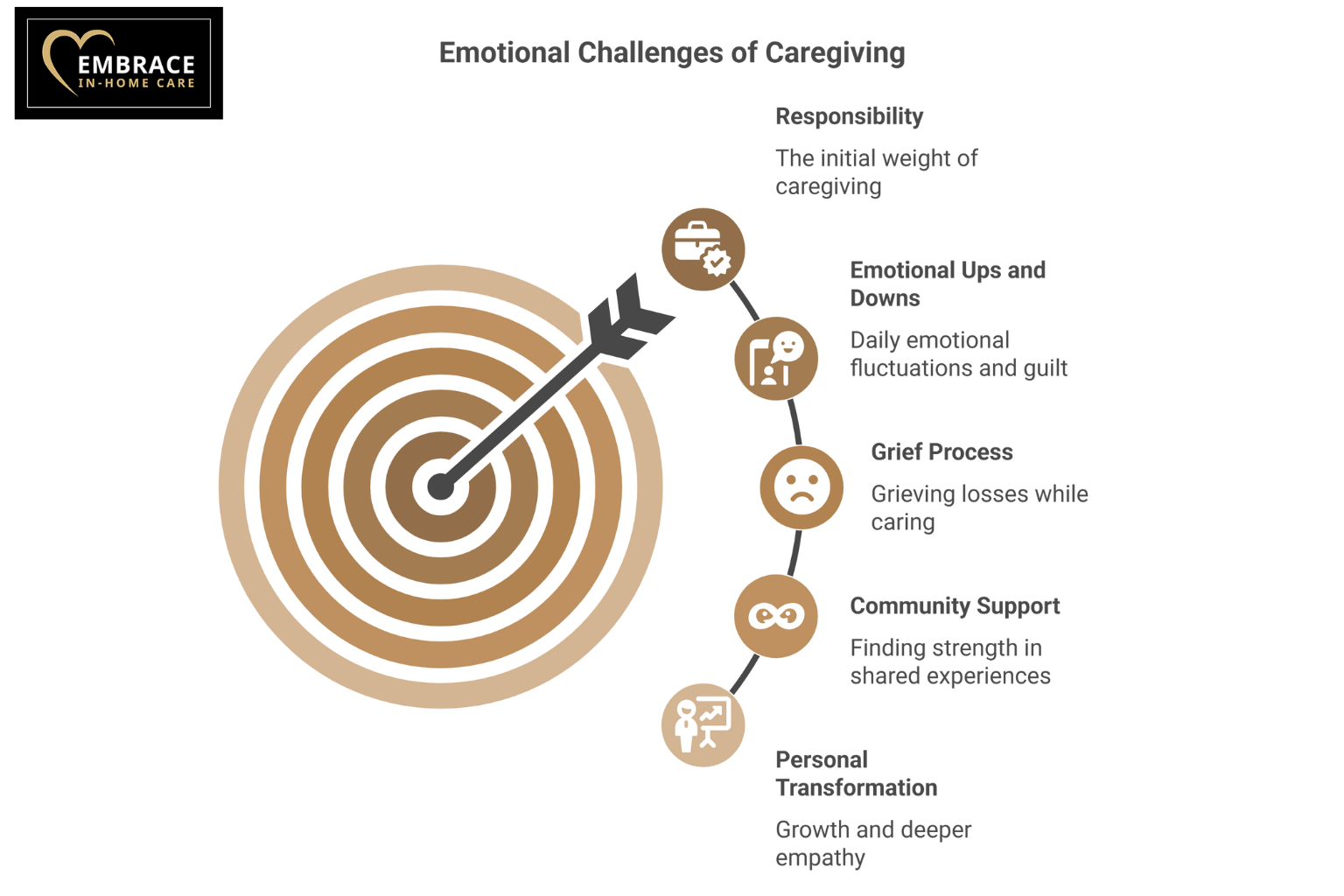
Table of Content
Caring for a senior family member through illness, aging, or disability creates one of life’s most complex emotional experiences. While deeply meaningful, this journey brings unexpected challenges that can leave even the most prepared caregivers feeling overwhelmed and uncertain about the path ahead.
The Initial Wave of Responsibility
When you first step into a caregiving role, the weight of responsibility can feel overwhelming. Many caregivers describe a sudden shift from their previous relationship dynamic to becoming the primary support system for someone they love.
Common initial emotions include:
- Fear about making the wrong decisions
- Anxiety about providing adequate care
- Guilt over past regrets or unresolved conflicts
- Determination to do everything perfectly
This transition period often brings sleepless nights spent researching medical conditions, insurance options, and care facilities. The learning curve feels steep, and many new caregivers experience imposter syndrome, wondering if they’re truly capable of handling such an important role.
The day-to-day reality of caregiving brings constant emotional fluctuations. One moment you might feel proud of helping your loved one maintain his or her dignity and independence. The next, you could find yourself frustrated by your loved one’s resistance to necessary changes or saddened by his or her decreasing abilities.
These emotional swings are completely normal, yet many caregivers feel guilty about experiencing negative feelings toward someone they’re trying to help. Resentment might build during particularly difficult days, followed immediately by shame for having those thoughts. This internal conflict becomes another layer of emotional complexity to manage.
Physical exhaustion compounds these emotional challenges. When you’re running on little sleep and high stress, even minor setbacks can trigger disproportionate emotional responses.
Seniors can face a variety of age-related challenges. Though some families choose to take on the caregiving duties, there may come a time when they need a trusted home care service provider. Families sometimes need respite from their duties so they can focus on their other responsibilities, and some seniors need around-the-clock assistance that their families are not able to provide. Embrace In-Home Care is here to help.
The Grief Process while Your Loved One Is Still Here
One of the most unexpected aspects of caregiving involves grieving losses while your loved one is still alive. You might mourn the person your loved one used to be, the relationship you once shared, or the future you had planned together.
This anticipatory grief can include:
- Missing your loved one’s personality before illness changed him or her
- Feeling sad about activities you can no longer enjoy together
- Grieving your own lost independence and social connections
- Processing the reality of eventual loss
These feelings exist alongside moments of deep connection and gratitude. You might discover new depths to your relationship or feel honored to provide comfort during your loved one’s vulnerable moments. This emotional contradiction—grieving while still caring—can leave many people feeling confused about what they’re supposed to feel.
Finding Strength in Community
Isolation often accompanies the caregiving journey, but connecting with others who understand your experience can provide tremendous relief. Support groups, whether online or in person, offer safe spaces to express difficult emotions without judgment.
Many caregivers find comfort in:
- Sharing stories with others in similar situations
- Learning practical tips from experienced caregivers
- Receiving validation that their challenges are normal
- Building friendships with people who understand their schedule constraints
Professional counseling can also provide valuable tools for processing complex emotions and developing healthy coping strategies. Many therapists specialize in caregiver support and understand the unique psychological challenges this role presents.
Family caregivers need to care for their own wellbeing. If you’re caring for an aging loved one and are feeling overwhelmed, consider hiring a professional caregiver to provide respite care. Green Valley families who want to prevent burnout can turn to Embrace In-Home Care. One of our professional caregivers can assist your loved one at home while you take a nap, go to work, run errands, or go on vacation.
Embracing the Transformation
Despite its difficulties, the caregiving journey often leads to profound personal growth. Many people discover inner strength they didn’t know they possessed and develop deeper empathy for others facing similar challenges.
This experience might teach you to:
- Appreciate small moments of joy more fully
- Set boundaries while still showing love
- Accept help from others gracefully
- Find meaning in difficult circumstances
The person you become through this process carries these lessons forward, often leading to more authentic relationships and a clearer understanding of what truly matters in life.
If you’re feeling stressed and overwhelmed by your caregiving responsibilities, a professional caregiver can provide the support and encouragement you and your loved one need. Families looking for top-rated Green Valley elderly home care providers can reach out to Embrace In-Home Care. From respite care to specialized Alzheimer’s, dementia, stroke, and Parkinson’s care, there are many ways we can make life easier for seniors and their loved ones. Call one of our dedicated Care Managers today to learn about the high quality of our in-home care services.
